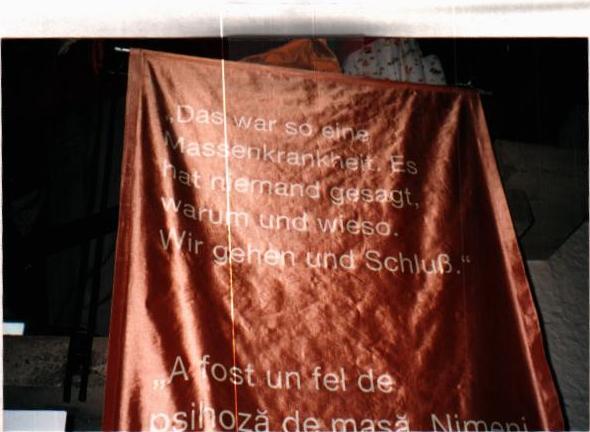The Umsiedlung, The return immigration of the German people in Bucovina, to other areas in Europe. 
This banner was displayed at the Universtiy Exhibition about the Resettlement of the German-Bohemians in 1940.
In German:
"Das war so eine Massenhrankheit. Es hat niemand gesagt, warum und wieso. Wir gehen und Schluss."
In English:
" That was a disease of the masses. No one said why or what for. We went and that was the end." Bukowina is a land in the eastern Carpathian forest. Between 1775 and 1918 it was a part of the Austrio-Hungarian Empire. The German people came from Pfalz, Baden, Wurttemberg, Franken, Bohmen, und Zips. They lived with Romanians, Ukranians, Jews, Poles, and other groups in a peaceful manner and practiced their languages and cultures. In 1875 a German University was founded in Czernowitz.
In 1940, the 165 year period of the German Bucovina people came to an end, when Russia occupied North Bucovina. The governments involved issued an order for all German people to vacate. They were given some compensation, packed up all their possessions, and were relocated into many other countries that were under German control.
In 1949, the Bukowina Society was formed in Germany, to locate and help those relocated people.
Many of the people on our tour were either born in Bucovina and were part of the Umsiedlung, or their parents were part of it. Perhaps the Umsiedlund was a blessing in disguise because Bucovina is still so poor today. See the Bucovina Society page for more informatin. The following is a brief history of a Leontina Kastel,as told in the Bucovina newsletter.
I was born in 1911 in Czernowitz; there were 7 of us children. My father had the fancy hardware store. My brother took over the hardware store when my father died in 1928. I married Felix Kastel in 1929 and we had two daughters. Our large family had wonderful times. Bukowina was our homeland.
In 1940 we were relocated to Dombrowa in Oberschlesien. In 1942 my husband was drafted and fell in France in 1944. We were all alone; my mother and my children, 10 and 6 years old. On Jan. 17, 1945 we had to escape. My man was lost, my home was lost; all lost.
We lived in Austria until 1952. I worked for a gardener; we got wood in the forest and things for our house from the bombed houses. At night I sewed clothes for friends. Finally, I came to Wiesbaden and have been there almost 50 years. Everyday I thank God that I am alive. I have 2 daughters, 6 grandchildren and 8 great-grandchildren. Aren't I rich? |

